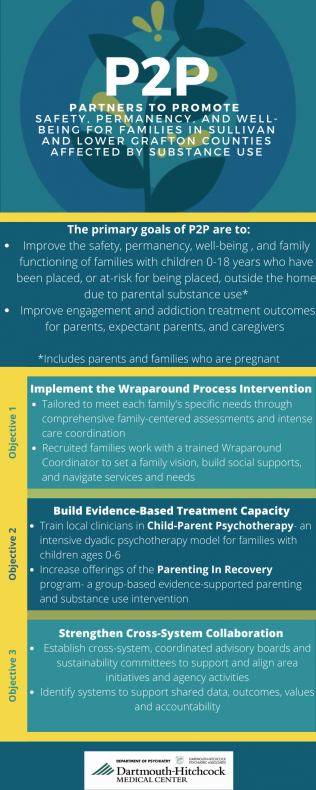Partners to Promote Safety, Permanency and Well-Being for Families Affected by Substance Use
Partners to Promote (P2P) aims to improve the safety, permanency, well-being and functioning of families expecting a baby or parenting children 0 to 17 years who have been placed, or are at risk of being placed, outside the home due to parental substance use.
The objectives of P2P
The three main objectives of P2P are to:
- Implement a Wraparound intervention to improve engagement in multigenerational services tailored to meet each family’s specific needs through comprehensive family-centered assessment and intense care coordinator. We plan to recruit 80 families into the Wraparound intervention serving Sullivan and Lower Grafton Counties, NH, as well as Windsor, Northern Wyndham, and Southern Orange Counties, VT. We will compare outcomes to a control group of families drawn from a different region.
- BASIC Inclusion/Exclusion criteria for Wraparound
- Expecting parent and/or parent/guardian of children birth to age 17 where one or both parents have self-reported or screened positive for a substance use disorder within the past year (excluding tobacco and cannabis/marijuana as the primary substance
- Child(ren) is in out of home placement or at risk for out of home placement
- Parent/guardian lives in the Claremont, NH District Office catchment area (Sullivan County or Lower Grafton County, NH) or the Springfield or Hartford, VT DCF district office catchment areas (Windsor, northern Wyndham, southern Orange County, VT)
- This project is no longer taking new referrals as it reaches the end of the current granting period. Please check back for updates as it may open referrals again in the future.
- BASIC Inclusion/Exclusion criteria for Wraparound
- Expand capacity of Child-Parent Psychotherapy and Parenting in Recovery program in the region.
- Build cross-system collaboration and infrastructure across state divisions and community providers, and across both child and adult service systems.
In the short term, we expect to improve child and family engagement in services; increase partner and provider engagement and collaboration; and execute policies and procedures that support trauma-informed and de-stigmatizing practices. In the long term, we expect to improve child well-being, permanency and safety; family functioning and parental recovery; and increased interagency coordination and collaboration, including shared values and approaches to address parental substance use.
This website is supported by Grant Number [90CU0109] from the Administration for Children, Youth, and Families within the Administration for Children and Families, a division of the U.S. Department of Health and Human Services. Neither the Administration for Children and Families nor any of its components operate, control, are responsible for, or necessarily endorse this website (including, without limitation, its content, technical infrastructure, and policies, and any services or tools provided). The opinions, findings, conclusions, and recommendations expressed are those of the author(s) and do not necessarily reflect the views of the Administration for Children and Families.
